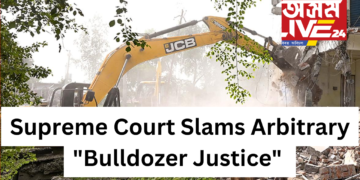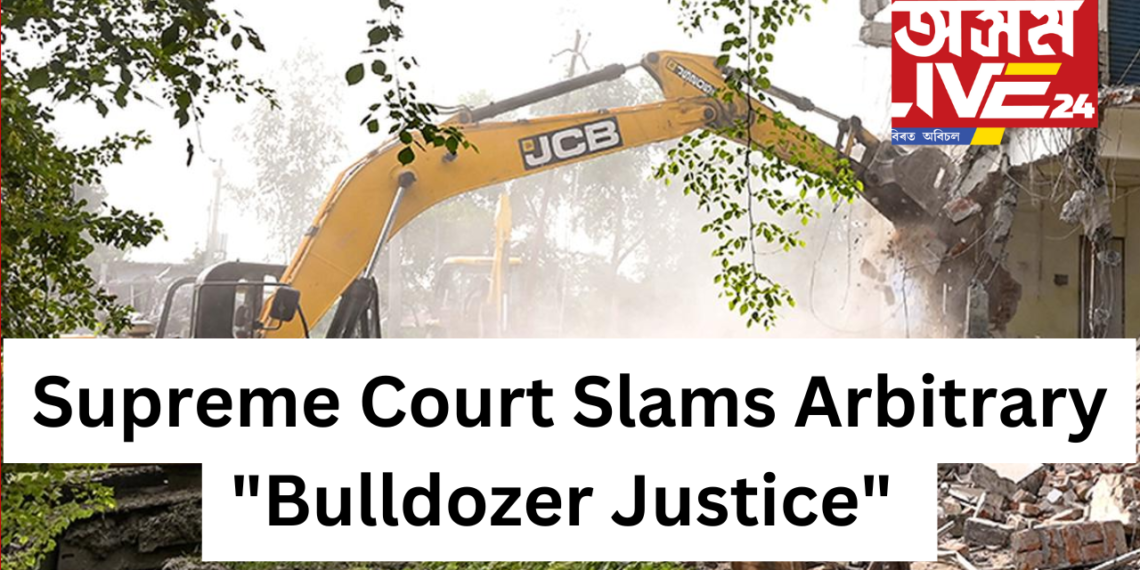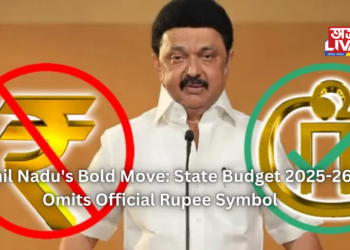In a strong condemnation of “bulldozer justice,” the Supreme Court on Wednesday asserted that the executive cannot overstep the judiciary and demolish people’s homes solely on the grounds of being accused of crimes. The court laid down strict guidelines for property demolitions and warned that officials responsible for such actions would be held accountable.
While hearing petitions challenging the arbitrary demolition of properties, the Court emphasized that such actions violate the constitutional principle of separation of powers. The bench of Justices BR Gavai and KV Vishwanathan highlighted that it is not the role of the executive to adjudicate guilt, and demolitions must not occur without a judicial order.
The Court warned against the “executive’s excesses,” stressing that such arbitrary actions disrupt legal foundations and undermine the rule of law. It also underlined that errant officials must face consequences for acting beyond their authority.
In a significant interim order, the Court instructed authorities to halt all demolition drives until further notice, calling them into question unless backed by a judicial ruling.
This ruling came in response to concerns over demolitions carried out without due process, particularly against individuals merely accused of crimes, raising serious constitutional and human rights issues.
The Court’s ruling underscores the need for legal oversight in actions that impact citizens’ rights and property. It sends a strong message that executive overreach will not be tolerated and that any unlawful demolitions must be corrected through judicial intervention.
This landmark decision marks a crucial moment in the ongoing dialogue around justice and accountability in India, reinforcing the importance of upholding legal rights in the face of executive power.Supreme Court Slams Arbitrary “Bulldozer Justice,” Lays Down Strict Guidelines on Property Demolitions
In a strong condemnation of “bulldozer justice,” the Supreme Court on Wednesday asserted that the executive cannot overstep the judiciary and demolish people’s homes solely on the grounds of being accused of crimes. The court laid down strict guidelines for property demolitions and warned that officials responsible for such actions would be held accountable.
While hearing petitions challenging the arbitrary demolition of properties, the Court emphasized that such actions violate the constitutional principle of separation of powers. The bench of Justices BR Gavai and KV Vishwanathan highlighted that it is not the role of the executive to adjudicate guilt, and demolitions must not occur without a judicial order.
The Court warned against the “executive’s excesses,” stressing that such arbitrary actions disrupt legal foundations and undermine the rule of law. It also underlined that errant officials must face consequences for acting beyond their authority.
In a significant interim order, the Court instructed authorities to halt all demolition drives until further notice, calling them into question unless backed by a judicial ruling.
This ruling came in response to concerns over demolitions carried out without due process, particularly against individuals merely accused of crimes, raising serious constitutional and human rights issues.
The Court’s ruling underscores the need for legal oversight in actions that impact citizens’ rights and property. It sends a strong message that executive overreach will not be tolerated and that any unlawful demolitions must be corrected through judicial intervention.
This landmark decision marks a crucial moment in the ongoing dialogue around justice and accountability in India, reinforcing the importance of upholding legal rights in the face of executive power.
এনেধৰণৰ অন্যান্য বা-বাতৰিৰ বাবে লাইক কৰক অসম লাইভ ২৪ ৰ ফেচবুক পেজ






















